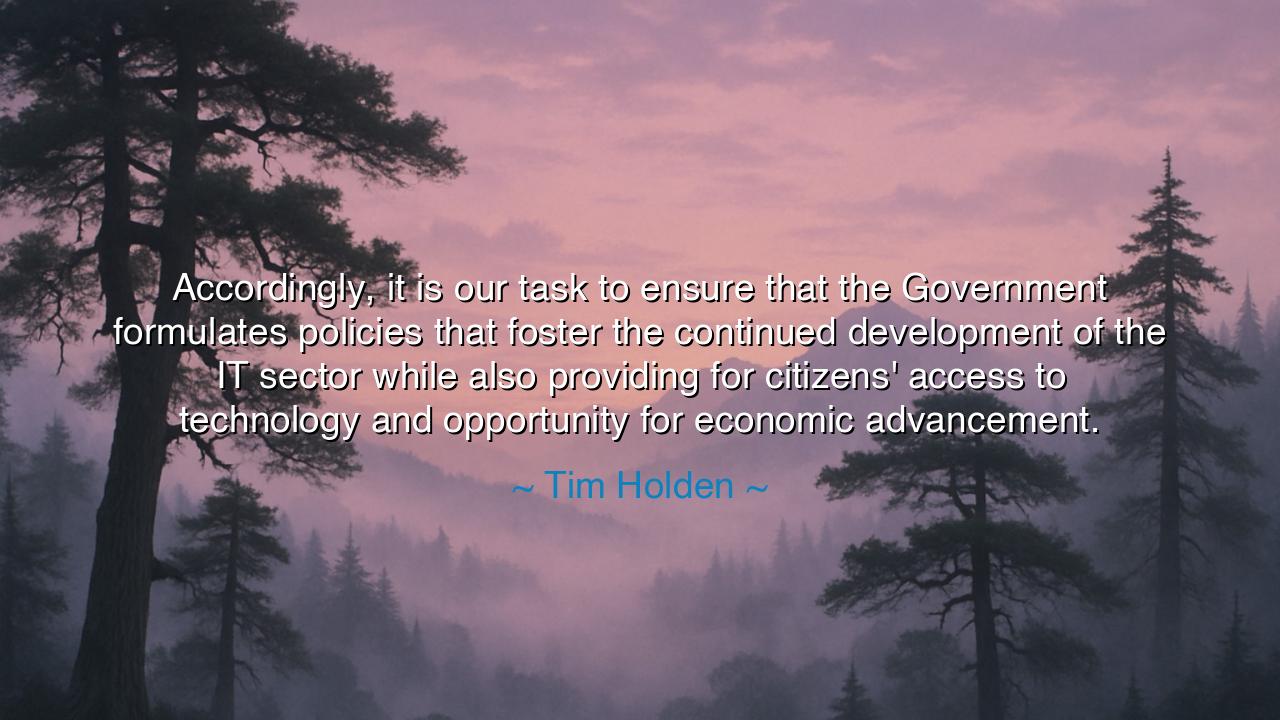
Accordingly, it is our task to ensure that the Government
Accordingly, it is our task to ensure that the Government formulates policies that foster the continued development of the IT sector while also providing for citizens' access to technology and opportunity for economic advancement.






When Tim Holden proclaimed, “Accordingly, it is our task to ensure that the Government formulates policies that foster the continued development of the IT sector while also providing for citizens' access to technology and opportunity for economic advancement,” he was voicing a truth both modern and eternal: that progress must serve the people, not distance them. His words echo the wisdom of every age that has grappled with the tension between innovation and justice, between the advance of power and the dignity of those it affects. Holden, an American legislator deeply engaged in questions of economic growth and technological policy, spoke not merely of computers and wires — he spoke of the sacred balance between knowledge and equity, between invention and inclusion.
The origin of this quote lies in the dawn of the digital era, when the Internet was transforming from a tool of privilege into a universal medium of connection. Governments, industries, and citizens alike were awakening to the realization that technology was no longer optional — it had become the bloodstream of modern civilization. Yet Holden saw, as the wise often do, that advancement without accessibility leads to division, and that a society’s greatness is measured not by how high its elite can rise, but by how far its poorest can reach. His statement was a call to moral stewardship — that those in power must not only encourage innovation but ensure that its fruits are shared widely and justly.
His words recall an ancient pattern seen throughout human history. In the Industrial Revolution, factories and machines reshaped the world, but they also deepened the gulf between the wealthy and the working class. For a time, technology seemed a tyrant’s tool, not a liberator’s gift. Only when governments and visionaries stepped forward — enacting labor laws, expanding education, and investing in public welfare — did progress become humane. Holden’s insight stands within that same lineage: that technology must be guided by conscience, lest it become an engine of inequality instead of a bridge to prosperity.
Consider, for example, the story of South Korea in the late 20th century. Once a nation scarred by war and poverty, it committed itself to technological advancement as a path to national renewal. But unlike others, its leaders ensured that access to education and digital infrastructure extended to the entire population. Rural villages received Internet access, schools were wired, and a culture of innovation was nurtured among all social classes. Within a generation, South Korea became a global leader in both technology and economic opportunity — a living embodiment of Holden’s vision that the advancement of technology and the empowerment of citizens must walk hand in hand.
Yet Holden’s warning also carries a shadowed tone. For in every era, the temptation arises to let progress outrun morality, to let the marketplace of invention ignore the marketplace of human need. If the state fosters technology without ensuring access, it builds towers without foundations. If it focuses on profit without participation, it creates a new aristocracy — not of birth, but of bandwidth. The digital divide, like the class divide of old, can fracture the unity of nations and sow resentment where there should be hope. Thus, Holden’s call was not only pragmatic — it was ethical, demanding vigilance so that the engines of progress never forget the faces of the people.
His message, when spoken in the style of the ancients, is a covenant: that wisdom must guide power, and justice must guide creation. To govern well is not to build systems that serve themselves, but to weave together prosperity and compassion. The wise ruler ensures that every child, every worker, and every dreamer has access to the tools that shape the age. To withhold such access is to silence the voice of the future before it can speak.
The lesson of Tim Holden’s quote is therefore profound and enduring: progress without inclusion is not progress at all. Every advance in knowledge, every spark of innovation, must be accompanied by an equal rise in opportunity. Leaders must remember that technology is not an idol to be worshipped, but a servant to humanity. And citizens, too, must take up the responsibility to learn, adapt, and share in the building of the digital world.
Let the generations that follow understand: a civilization’s greatness is not measured by the speed of its machines, but by the breadth of its compassion. Let governments craft policies that unite innovation with justice, and let people use knowledge not for dominion, but for upliftment. For when technology becomes the inheritance of all, the human story moves forward — not just swiftly, but wisely.






AAdministratorAdministrator
Welcome, honored guests. Please leave a comment, we will respond soon